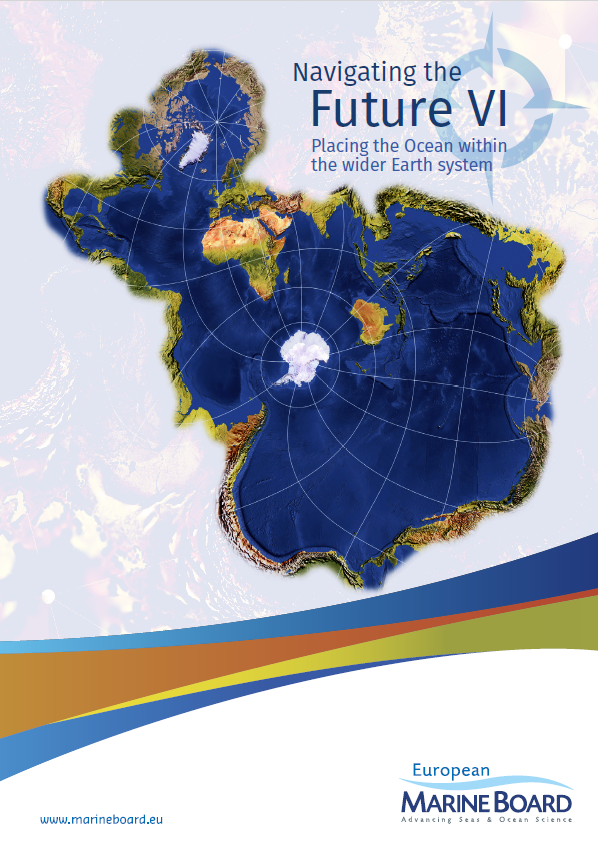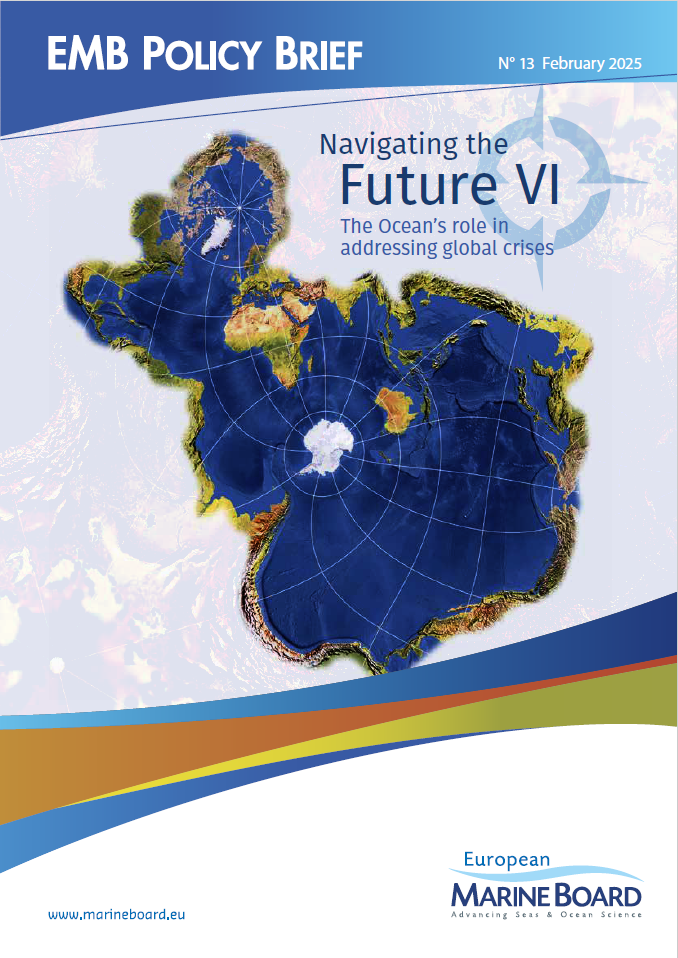
Output

Position Paper 28 "Navigating the Future VI: Placing the Ocean within the wider Earth system" was published on 23 October 2024. This is the sixth edition of the Navigating the Future series.
You can download the document here and read the news item about its launch here.
Summary graphics were created for NFVI by Martijn van Overbruggen from WIM Ontwepers. These are available under CC-BY-NC 4.0 license and can be downloaded here.
This document was launched at a dedicated launch event.

Policy Brief 13 "Navigating the Future VI: The Ocean's role in addressing global crises" was published on 25 February 2025 and summarises the main recommendations of the Position Paper.
You can download the document here and read the news item about its launch here.
Background
In October 2022, EMB began working on Navigating the Future VI. NFVI takes a holistic perspective to highlight the science needed to understand the links between the Ocean and the global Earth system, society, and public policy, so that knowledge about the Ocean can take a central role in planning for a sustainable future. In short, it aims to highlight the Ocean’s place in the world.
A key principle that is strongly represented across all chapters of NFVI is a transdisciplinary approach to knowledge production. To achieve a sustainable future, difficult decisions will need to be made. This will require stronger connections between academic disciplines including science, technology, engineering & mathematics (STEM), humanities, social sciences, and political sciences, as well as engaging government, industry, and citizens to co-design the knowledge needed for sustainable development.
Objectives
NFVI develops recommendations for knowledge-based solutions to address key societal challenges on how humanity is going to live in harmony with the Ocean. It provides recommendations on how to close knowledge gaps on these fundamental aspects of marine science and how to make these discoveries visible and understandable to policy makers, industry, and society at large. NFVI is structured around four key chapters, selected due to their link to policy interest at national, European, and international level and their transdisciplinary nature: Ocean and People; Ocean and Climate; Ocean and Fresh Water; and Ocean and Biodiversity.
NFVI takes stock in terms of progress towards achieving the goals of UN Decade of Ocean Science for Sustainable Development, the EU’s Mission Restore our Ocean and Waters (and other EU Missions), and the European Commission’s Horizon Europe Framework funding programme at their mid-term points. It provides recommendations for what is missing in terms of research needs and how to ensure that science is accessible for informing these initiatives.
NFVI was written by a Working Group comprised of one representative from each of EMB’s Member organisations.
Terms of Reference
The Terms of Reference produced for the operation and objectives of this Working Group can be consulted here (June 2022).
Members
Chair: Gilles Lericolais, EMB Chair and IFREMER, France
Co-Chair: Sheila JJ Heymans, EMB Executive Director
Working Group Members:
Ocean and People
Francesco Marcello Falcieri, National Research Council - Institute of Marine Science, Italy
Juliette Biquet, Center of Marine Sciences, Portugal, and EMB Young Ambassador
Nicola Beaumont, Plymouth Marine Laboratory, UK (UK Natural Environment Research Council)
Silja Klepp, Kiel University, Germany (German Marine Research Consortium)
Lucía López-López, Spanish Institute of Oceanography, Spain
David Lusseau, Technical University of Denmark, Denmark
Ekaterina Popova, National Oceanography Centre, UK
Baris Salihoglu, Middle Eastern Technical University, Türkiye (Scientific and Technological Research Council of Türkiye)
Olivier Thébaud, French Research Institute for Exploitation of the Sea, France
Ocean and Climate
Katrin Schroeder, National Research Council - Institute of Marine Science, Italy
Fiona Grant, Marine Institute, Ireland
Joke Lübbecke, Helmholtz Centre for Ocean Research Kiel, Germany
Ruth Plets, Flanders Marine Institute, Belgium (Research Foundation - Flanders)
Jean-Baptiste Sallée, French National Centre for Scientific Research, France
Tarmo Soomere, Tartu Technical University, Estonia (Estonian Academy of Sciences)
Nuria Teixido, Stazione Zoologica Anton Dohrn, Italy
Ivica Vilibić, Institut Ruđer Bošković, Croatia
Renske de Winter, Deltares, Netherlands
Ocean and Fresh Water
Peter Kraal, Royal Netherlands Institute for Sea Research, Netherlands
Tainá Fonseca, University of Algarve, Portugal (Portuguese Science and Technology Foundation)
Christine Edwards, Robert Gordon University, UK (Marine Alliance for Science and Technology for Scotland)
João Frias, Atlantic Technological University, Ireland (Irish Marine Universities Consortium)
Slavica Matijević, Institute of Oceanography and Fisheries, Croatia
Cosimo Solidoro, National Institute of Oceanography and Applied Geophysics, Italy
Beata Szymczycha, Institute of Oceanology of the Polish Academy of Sciences, Poland
Ocean and Biodiversity Carlos Pereira Dopazo, University of Santiago de Compostela, Spain (Galician Marine Technology Centre) Enrique Blanco Gonzalez, University of Agder, Norway (Norwegian Marine University Consortium) Julia Calderwood, Marine Institute, Ireland Antonia Giannakourou, Hellenic Centre for Marine Research, Greece Kerstin Johannesson, University of Gothenburg, Sweden Christophe Lejeusne, Aix-Marseille University, France (Marine Universities of France) Loïc Michel, University of Liege, Belgium (Walloon Fund for Scientific Research) Geir Ottersen, Institute of Marine Research, Norway
Contact at European Marine Board Secretariat: Paula Kellett Email
EMBCP Communications Support: Kim Sauter (NIOZ, Netherlands)
Image credit: NOAA, US